Tales from the Terminal Room ISSN 1467-338X
August 2013, Issue No. 114
Editor: Karen Blakeman
Published by: RBA Information Services
Tales from the Terminal Room (TFTTR) is an electronic newsletter that includes reviews and comparisons of information sources; useful tools for managing information; technical and access problems on the Net; and news of RBA's training courses and publications. Many of the articles will have already appeared on Karen Blakeman's Blog at http://www.rba.co.uk/wordpress/
Tales from the Terminal Room can be delivered via email as plain text or as a PDF with active links. You can join the distribution list by going to http://www.rba.co.uk/tfttr/index.shtml and filling in the form. You will be sent an email asking you to confirm that you want to be added to the list. TFTTR is also available as an RSS feed. The URL for the feed is http://www.rba.co.uk/rss/tfttr.xml
In this issue
- Search tools
- Google adds in-depth articles to results
- Google expands define but drops dictionary
- Updates to Search Strategies
- Does price guarantee quality of information?
- How the UK's electricity is generated
- Dunkirk little ships and the Reading Festival
- Twitter notes
- Forthcoming workshops and meetings
- Discover Sourcing 2013 afternoon pre-conference workshop on search skills, 17th September 2013, London
- Business Information: Key Web Resources, 19th September 2013, London
- How to Make Google behave: techniques for better results, Wednesday, 30th October 2013
- Free resources and search techniques for EU and UK legislation, Wednesday, 13th November 2013, London
- Anything but Google, Tuesday, 19th November 2013, London
Search Tools
Google adds in-depth articles to results
Google is rolling out a new addition to search results called “In-depth articles” (http://insidesearch.blogspot.ca/2013/08/discover-great-in-depth-articles-on.html):
“To understand a broad topic, sometimes you need more than a quick answer. Our research indicates perhaps 10% of people's daily information needs fit this category — topics like stem cell research, happiness, and love, to name just a few. That's why over the next few days we'll be rolling out a new feature to help you find relevant in-depth articles in the main Google Search results.”
The articles appear as a block of three at the bottom of your results, if you only display 10 results per page, or in the middle of the page if you display more. As Google says, they appear if your search is fairly broad and they do not appear for every query. I had to run several different searches before I found an example. At present it is only available in Google.com
My search on thorium reactor started with a Wikipedia article at the top, which seems all too often to be the default. Further down the page was a block of three “in-depth” articles from Wired, Cosmos Magazine and Nature.
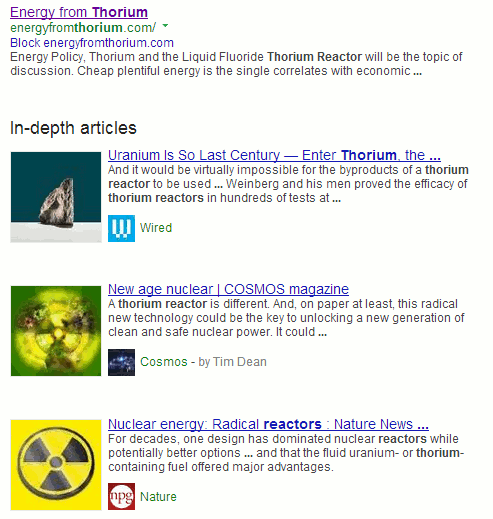
They do not appear at all if you use a Chrome Incognito window or your browser's private browsing option and they disappear if you apply Verbatim to your results.
How useful are these articles? They are certainly lengthy and in depth but only the one from Nature was fairly recent (December 2012). The one from Wired was published in 2009 and the Cosmos Magazine article appeared in 2006. I tried limiting my search to articles published in just the last year using Search Tools, Any time, Past year. The documents in the main results changed but the in-depth articles remained the same. The Nature article is highly relevant but there are more recent documents to be found than those from Wired and Cosmos. This raises the question as to how these articles are selected. I have not yet found any reliable information on how it is done, although Google's Webmaster Central Blog has provided a checklist that may help get an article into the triumvirate (http://googlewebmastercentral.blogspot.co.uk/2013/08/in-depth-articles-in-search-results.html). The Moz Blog has run an analysis on 352 searches and found that the major news sources feature heavily (see http://moz.com/blog/inside-indepth-articles for further details).
In theory, in-depth articles are a good way to find an overview of a topic but do check the dates. They may be horrendously out of date.
Google expands define but drops dictionary
Google has added extra information to its web definitions. When using the ‘define' command, an expandable box now appears containing additional synonyms, how the word is used in a sentence, the origins of the word, the use of the word over time and translations. At the moment it is only available in Google.com and you no longer need the colon immediately after define. So, for definitions of dialectic simply type in define dialectic .
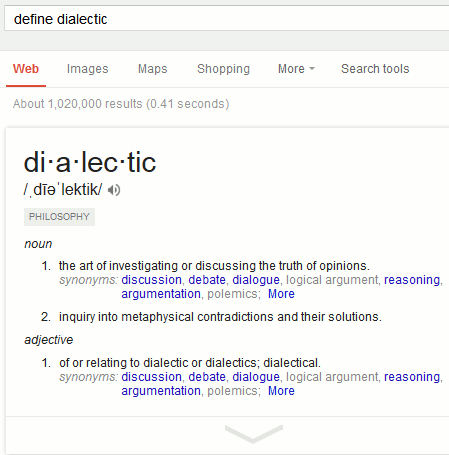
The box gives definitions and synonyms of the word and the ‘More' link gives you an example of its use in a sentence.
Click on the grey, downward pointing chevron to open the box and see information on the origin of the word, translations (beware – some are rather bizarre!), and use of the word over time. The last is powered by the Google Books Ngram Viewer, which shows the frequency of words in Google Books. Click on the graph, and you are taken to the Ngram Viewer where you can drill deeper into the data and see the use of the word in context.

Compare this with the old version of define results that are still displayed in Google.co.uk.
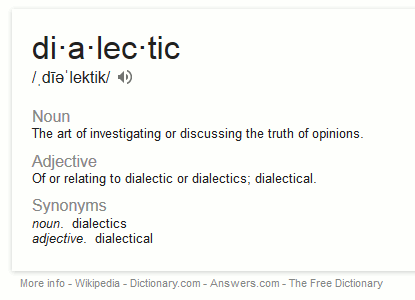
The new ‘define' box in Google.com certainly gives you much more varied information, but the Dictionary search option that provided extra definitions has been dropped. It used to be under ‘Search tools', ‘All results'. It can still be seen in Google.co.uk.
The new define only works on English words or words that have been absorbed into the English language. It can cope with schadenfreude and correctly defines tikka as “an Indian dish of small pieces of meat or vegetables marinated in a spice mixture”. When I asked it to define balti, though, it came up with a simple web definition of it being a city in Moldova. The standard Google web search results came up with the common UK usage of it as a type of curry served in a steel balti bowl. Our (UK) use of the word is probably too local for it to be have been picked up by Google. Similarly, phrases such as “chicken tikka” generally pull up a single web definition although some do trigger the translation options, for example “climate change”, “global warming”.
Overall, I like the new ‘define' but I regret the loss of the extra definitions that the Dictionary search option offered. Sometimes, the definitions that ‘define' offers are somewhat impenetrable. The Dictionary option provided a list of alternatives that were more understandable.
Updates to Search Strategies
The following fact sheets and chapters have been updated and added to Search Strategies (http://www.rba.co.uk/search/):
Updated
Search Tools: Summary and Comparison of Commands. The summary and comparison of commands (Google, Bing, DuckDuckGo) has been updated. Free fact sheet available at http://www.rba.co.uk/search/compare.shtml
Selected Google Commands. The Selected Google Commands fact sheet has been updated. Free fact sheet available at http://www.rba.co.uk/search/SelectedGoogleCommands.shtml
New
Assessing Quality: who is really behind a website? (Part of the subscription service)
This looks at how and if you can identify the owner of a website. It also covers issues associated with URL shorteners and articles that have been reposted to multiple sites. Full article is in the subscribers' are at http://www.rba.co.uk/search/subscribers/qualitywhoownsdomain.shtml
Search Strategies (http://www.rba.co.uk/search/) covers facts and tips, reviews of search tools and detailed strategies for more effective searching. Some information such as the fact sheets and Top Tips are available free of charge. The more detailed information on strategies is available on subscription. Annual individual subscription rates are £48/year (£40 + £8 VAT). Multi-user and corporate rates are available on request. For further details contact Karen Blakeman publications@rba.co.uk
If you do not wish to commit to an annual subscription some of the articles are available for purchase individually for the Kindle and as other ePUB versions (http://www.rba.co.uk/search/index.shtml#ePUB)
Does price guarantee quality of information?
I recently co-presented a webinar on researching legal information. The event was organised by TFPL, and Alan Blanchard and myself reviewed free and paid for resources together with key search techniques.
Throughout the session we polled the audience on a number of issues, the first question being “Does price guarantee quality when you are purchasing information?” Surprisingly, given the topic of the webinar, 70% voted ‘No' with the remaining 30% opting for ‘I don't know' rather than ‘Yes'. When we asked about their opinions on free information, though, 79% said they would need a result from a free source to be validated with a paid resource.
The audience could not qualify their answers – it was a simple yes/no/don't know – but there were some interesting discussions on the issues after the event. The priced services certainly have to work hard to prove value for money and they cannot assume that their users will automatically renew each year. Free information has a big part to play in legal and business research but it is vital that one is aware of the limitations of free. For example, do you know how up to date legislation.gov.uk is and if it carries revised legislation? (See http://www.legislation.gov.uk/help#aboutRevDate for the answer). And then there is the issue of making Google run your search the way you want it run, without personalisation or deviation.
I am running two public access workshops this autumn for TFPL that look at free versus fee resources for business and legal information. The first, on 19th September 2013, is ‘Business information: key web resources' (http://www.tfpl.com/services/coursedesc.cfm?id=TR945&pageid=-9&cs1=business%20information&cs2=a) and covers:
- Portals and key starting points
- Company information
- Industry information
- Official statistics, market research
- News sources, RSS and alerting services
- Social media and professional networks
The second is ‘Free resources and search techniques for EU and UK legislation' (http://www.tfpl.com/services/coursedesc.cfm?id=TR3838&pageid=-9&cs1=&cs2=f) and is on 13th November 2013. It will be looking at:
- How to use advanced search commands to find news and information on legislation
- How to use reading level and date ranges to focus the search
- Searching foreign language pages
- Options for searching journals, research information, grey literature
- Alternatives to Google, specialist tools and sites
- Assessing quality and relevance
Both days include practical sessions and places on the workshops are limited. Contact TFPL (http://www.tfpl.com/) for further information and bookings.
How the UK's electricity is generated
Gas and electricity supply, and energy in general, are constantly in the headlines in the UK. Reports on the anti-fracking protests at Balcombe recently dominated discussions on the topic but the central issue remains. How do we meet our energy needs in the future: gas, coal, nuclear, renewables? Looking at the level of current consumption and how it is generated is the key to understanding the nature of the problem. For electricity, there is detailed data available on the status of the UK National Grid and can now be viewed via a service called Gridwatch.
Gridwatch (http://www.gridwatch.templar.co.uk/index.php) shows the demand for electricity in the UK at any one time, the source and how it is being generated. The site is maintained by Templar Consultancy and uses near real-time data from BM Reports (http://www.bmreports.com/) on what the UK's electricity grid is doing. The data is updated every 5 minutes.
The data is presented as a series of dials so that you can easily see how much energy is generated and how that changes throughout the day. Most of the screen is taken up with dials for demand, coal, nuclear, CCGT (gas) and wind.
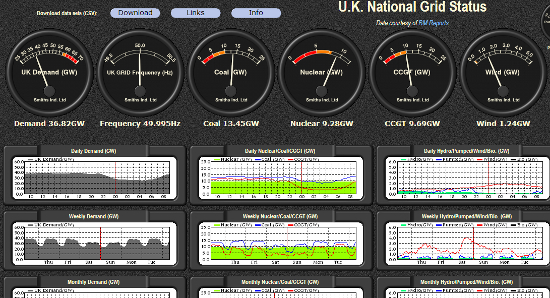
The right hand area of the screen shows how much electricity is generated through pumped hydro, hydro, biomass and oil, and the level of imported electricity.
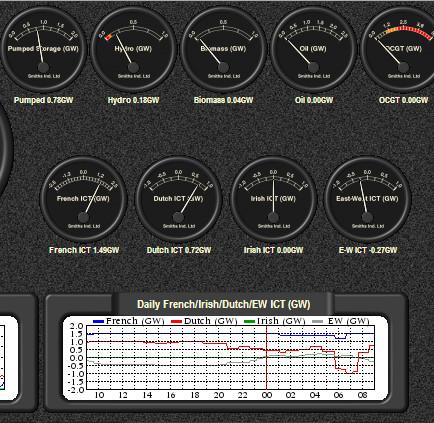
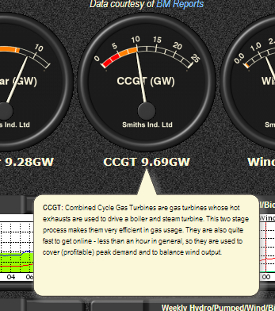
Move your cursor over a dial for further information on the different technologies and sources of generation. Coal and nuclear power stations are always switched on and provide most of what is called the base load of electricity required throughout the day. Gas makes up the difference and covers peak demand and balances the variable output from renewables such as wind.
There is very little change throughout the day during the summer months but the demand can increase dramatically during very cold weather in the winter. It is interesting to see how the dials shift as soon as people get up in the morning. Also, the amount of electricity produced via wind turbines drops to almost zero during stormy weather. The turbines are switched off in high winds to protect them from damage.
Warning: this site can be addictive, especially if you start monitoring it during late autumn and winter!
For more data and statistics on UK energy go to the Department of Energy and Climate Change (DECC) at https://www.gov.uk/government/organisations/department-of-energy-climate-change/about/statistics
Dunkirk little ships and the Reading Festival
August bank holiday weekend in Reading means Reading Festival (http://www.readingfestival.com/).
Festival goers started arriving in dribs and drabs on the Wednesday before and mass invasion began on the Thursday. The stages and campsites are upstream from Reading town centre and most of the fans arrive by train. A few walk to the campsite, many pile onto the extra buses laid on by Reading Buses, but it appears that the majority use what has become, over the last few years, the traditional means of transport – boats.
Every year boats ferry people to and from the festival site and among them are usually a couple of Dunkirk little ships. The emergency evacuation of Allied soldiers from the beaches and harbour of Dunkirk in France took place between 27 May and 4 June 1940. What were needed for the evacuation were boats with shallow draught, and hundreds of pleasure boats, private yachts and launches on the Thames and estuaries along the South and East coasts were involved in the evacuation.
Some of the “little ships”, as they came to be called, are still around and two of them - the Princess Freda and Devon Belle - work over the festival weekend. The Association of Dunkirk Little Ships (ADLS) was founded in 1966 following the 1965 25th anniversary commemoration of the Dunkirk evacuation. The ADLS web site (http://www.adls.org.uk) has a section that lists the specifications and history of the surviving little ships. The entry for Devon Belle, previously Seymour Castle, can be found at http://www.adls.org.uk/t1/content/devon-belle-previously-seymour-castle. It does not yet record the purchase of the boat by Thames Rivercruise (http://www.readingchronicle.co.uk/news/reading/articles/2010/05/20/46728-little-ship-sails-again/).
Check the ADLS database next time you go on a river trip. You may be cruising on a piece of history.
Twitter Notes
The following are some of my recent tweets and retweets. They are selected because they contain links to resources or announcements that may be of general interest. I have un-shortened the shortened URLs
1st August
Nazlin Bhimani @NazlinBhimani
Over a thousand medieval manuscripts to be digitized in Poland in partnership with IBM http://http://www.medievalists.net/2013/08/01/over-a-thousand-medieval-manuscripts-to-be-digitized-in-poland/ via medievalist
2nd August
Karen Blakeman @karenblakeman
UK Freedom of Information Blog: Practical training on using the FOI Act http://foia.blogspot.co.uk/2013/08/practical-training-on-using-foi-act.html
6th August
WelshLibraries @WelshLibraries
Welsh Newspapers Online 1,000,000 pages of Welsh history to 1910 free and online http://http://welshnewspapers.llgc.org.uk/en/home
7th August
Steve Dale @stephendale
Interesting read: SharePoint Is Dead - Long Live Office 365 http://www.cmswire.com/cms/social-business/sharepoint-is-dead-long-live-office-365-021976.php #socbiz
Charles Oppenheim ?@CharlesOppenh
Copyright infringement case involving the film "Deep Throat" - http://www.http://www.bbc.co.uk/news/entertainment-arts-23599544
9th August 2013
Bumble Watcher @Bumble_Watching
If you love insects, you'll love following @TWBC_Museum. So many really interesting tweets about micro fauna, it's a whole new world!
15th August
Karen Blakeman @karenblakeman
I particularly like number 19 "40 Maps That Will Help You Make Sense of the World" [Map of Where 29,000 Rubber Ducks Made Landfall After Falling off a Cargo Ship in the Middle of the Pacific Ocean]
http://http://twistedsifter.com/2013/08/maps-that-will-help-you-make-sense-of-the-world/
Tara Calishain @ResearchBuzz
Google Maps gets more special collections imagery: http://http://google-latlong.blogspot.co.uk/2013/08/get-closer-view-of-some-of-worlds-most.html
16th August
Ole Husby @OleHusby
... and [Google Scholar] provides greater access to free full-text articles [than PubMed] http://www.jmir.org/2013/8/e164/
19th August
Aaron Tay @aarontay
"Scopus, you're unravelling" Library Out Loud http://http://masseyblogs.ac.nz/library/2013/08/19/scopus-youre-unravelling-2/
30th August
Karen Blakeman?@karenblakeman
Wondering if this is true. Don't they get a fluent Welsh speaker to check? RT @stephendale: Email error ends up on road sign http://news.bbc.co.uk/1/hi/7702913.stm
Forthcoming workshops and events
Pre-conference Workshop: Discover Sourcing 2013 afternoon pre-conference workshop on search skills
Date: Tuesday, 17th September 2013
Venue: Prospero House, 241 Borough High St, London, SE1 1GA
Organiser: UK Sourcers & Sourcing Hat Ltd.
Outline: This afternoon workshop is for up to 40 attendees and is designed to challenge sourcing skills. It is aimed at working sourcers/researchers who would like to push themselves.
URL http://uksourcers.co.uk/discover-sourcing/
Workshop: Business Information: Key Web Resources
Date: Thursday, 19th September 2013
Venue: London
Organiser: TFPL
Presenter: Karen Blakeman
Outline: T his workshop looks in more detail at the resources that are available for different types of information, alerting services and free vs. fee. It also covers search strategies for tracking down industry, market and corporate reports.
URL: http://www.tfpl.com/services/coursedesc.cfm?id=TR945&pageid=-9&cs1=business%20information&cs2=a
Workshop: How to Make Google behave: techniques for better results
Date: Wednesday, 30th October 2013
Venue: London
Organiser: UKeiG
Presenter: Karen Blakeman
Outline . Having problems with Google? Fed up with it ignoring your search terms and giving you something completely different? Personalisation, localisation, social networks and semantic search are all being used by Google in an attempt to improve relevance but it can all go horribly wrong. Austria suddenly becomes Australia and your search for goat's cheese turns into identifying different species of buttercups! Nevertheless, just one really good result in the top five is often enough to persuade us to return to Google again and again. There are many tricks we can use to make Google return better results and this workshop will look in detail at the options that are currently available to us.
URL: http://www.ukeig.org.uk/trainingevent/karen-blakeman-make-google-behave-techniques-better-results-0
Workshop: Free resources and search techniques for EU and UK legislation
Date: Wednesday, 13th November 2013
Venue: London
Organiser: TFPL
Presenter: Karen Blakeman
Outline: This one day workshop will look at free resources and search techniques for locating news and information on EU and UK legislation. Such information could be on blogs, websites, in news articles, journals and government reports. The original source of the information may not be in English and assessing authority and timeliness is crucial.
URL: http://www.tfpl.com/services/coursedesc.cfm?id=TR3838&pageid=-9&cs1=&cs2=f
Workshop: Anything but Google
Date: Tuesday, 19th November 2013
Venue: London
Organiser: UKeiG
Presenter: Karen Blakeman
Outline . You can say “No” to Google, and there are times when Google is the worst possible tool for researching a project. There really are other search tools that can give you better results. This workshop will look at non-Google options for searching the web, different types of information and media.
URL: http://www.ukeig.org.uk/trainingevent/anything-google-karen-blakeman-0
Contact Information
Karen Blakeman, RBA Information Services
Twittername: karenblakeman (http://twitter.com/karenblakeman)
Email: Karen.blakeman@rba.co.uk
Tel: +44 118 947 2256
Address: 88 Star Road, Caversham, Berks RG4 5BE, UK
Subscribe and Unsubscribe
To subscribe to the newsletter fill in the online registration form at http://www.rba.co.uk/tfttr/index.shtml
To unsubscribe, use the registration form at http://www.rba.co.uk/tfttr/index.shtml and check the unsubscribe radio button.
If you wish to change your subscription from the PDF to the Plain Text version, send an email to tfttr@rba.co.uk with "Plain Text Version Please" in the subject line.
Privacy Statement
Subscribers' details are used only to enable distribution of the newsletter Tales from the Terminal Room. The subscriber list is not used for any other purpose, nor will it be disclosed by RBA Information Services or made available in any form to any other individual, organization or company.
Copyright
Tales from the Terminal Room by Karen Blakeman is licensed under a Creative Commons Attribution-Non-Commercial 3.0 Unported License. For permissions beyond the scope of this license contact Karen Blakeman by email at Karen.Blakeman@rba.co.uk

